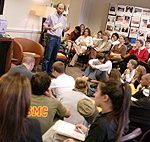More than 60 students, faculty and staff packed the Isabella Cannon Centre for International Studies late Tuesday afternoon for a discussion on the Iraq situation...

Philosophy professor Anthony Weston moderated the discussion. The softspoken professor began by observing a moment of silence and then setting some guidelines for the discussion, which he called “Common Ground.”
“No one side has a monopoly on what it is to be American, what it is to be loyal, what it is to support the troops,” Weston said. “No one’s commitment to America is questioned.” He encouraged the group to “start with commonality rather than opposition.”
Jeff Pugh, professor of religious studies, began the discussion by reading some thoughts he had prepared on the Iraq issue. Pugh said that he believes that President Bush is sincere in his beliefs that a war with Iraq is the best course for the country. “The real question is, what type of country do we want to be, and what type of people do we want to become?” he said.
The discussion then turned to the Gulf War and the subject of terrorism. One student, a sophomore from New York City, said that although she is well aware of the devastation of the 9/11 attacks, she does not support a war with Iraq.
“These people believe that we kind of terrorize them,” she said. “What exactly are we going in there for? I think we’re going to kill a lot of innocent Americans and innocent Iraqis. I don’t want to go through another September 11th.”
As students discussed possible motivations for a war with Iraq, one student said he thinks disarming Saddam Hussein is inevitable. “If we don’t disarm him now, what about five years from now? What other way besides war is there to approach what we’re doing now?”
The group then discussed possible alternatives to war, such as indicting Hussein for human rights violations and increasing cultural understanding.
Tom Arcaro, professor of sociology, encouraged the group to use communication as a possible alternative. “If we keep expanding the circle of contacts we have, that’s in the interest of nonviolence.”
Other suggested alternatives included creating more scholarships for Muslim students to attend Elon, participating in student exchange programs and communicating with a sister school in Iraq.


